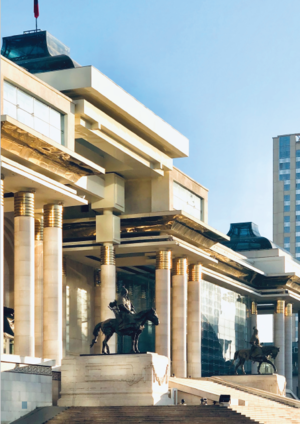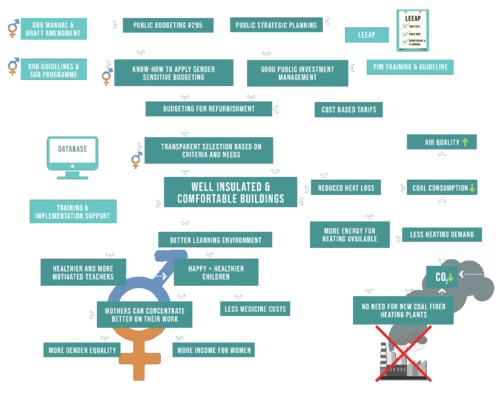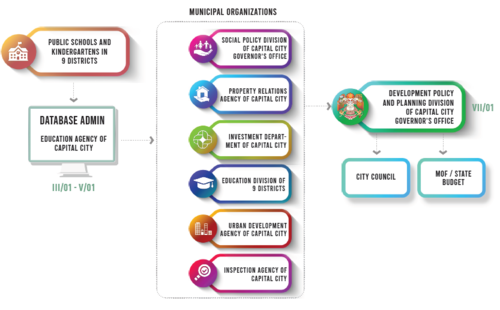Governance in the Municipality of Ulaanbaatar
Governance in the Municipality of Ulaanbaatar
Many public buildings, such as hospitals, schools, kindergartens, libraries, and dormitories were built several decades ago when standards were much lower than today. Low building standards and a lack of maintenance over the years are the main reasons for the significant increase in heat loss, and subsequently high energy consumption.On the one hand, studying or working in cold buildings with high heat loss has a negative impact on productivity, health and quality of life. On the other hand, it leads to a significant increase in energy consumption and operating costs, which places a strain on the budget and increases greenhouse gas emissions. For all those reasons it was important to improve the management of public investments, and introduce new standards to improve energy efficiency through better planning, budgeting, financing, implementation and monitoring of project activities. As part of the cooperation between MUB and GIZ, the focus of the governance advisory work was therefore on enriching the core system with institutional quality and principles of good governance.
Transparent criteria for the rating and selection of buildings for renovation measures have been developed, endorsed, and made public. A public investment guide has been developed and introduced to all relevant stakeholders. In addition, officials and staff were empowered through training and advisory services in order to support state organisations in creating an open, transparent, and people-centered environment.
The MUB has significantly improved the accessibility of services to meet the needs of its citizens. The efficiency of investments was increased, and the implemented policies deliver tangible results for the general public as well as specific target groups, such as the poor and vulnerable.
Why Energy Efficiency is also a Gender Topic
To fulfill the needs of different groups in society, public decision makers should ensure that studying and teaching is possible in a children friendly, safe, accessible and effective learning environment that provides comfortable air quality, cognitive & ecological education, hygiene, security and the oportunity to fulfill social needs.
If those needs are not considered children can for example, face the risk of falling ill due to low temperatures and unhealthy indoor air quality, traffic accidents due to missing safety measures and lacking behind their cohort fellows in learning, due to an unpleasant education environment. Taking care of sick children is still considered the task of a mother. As a consequence, it is mostly woman that suffer from lower economic posibilities if they have to take unpaid leave days, while caring for sick children and additionally spend money on medicine.
In parent and teacher monitoring groups the project supported these participants alongside the monitoring and construction process, to analyse their children’s school and kindergarten environment conditions and developed solutions to fulfill the mentioned needs. Thermo-technical retrofitting improved the learning environment by creating higher indoor temperatures and better accessibility, working sanitary facilities and in some cases could also provide new learning spaces. In addition, the moderated process of the renovation monitoring group allowed the groups to identify other measures that often could be implemented without high costs but helped to fulfill the above mentioned needs of the children. Negative effects of sick children were reduced significantly.
"The current planning is gender blind. Therefore, it needs to be changed (...) the pilot showed us that making buildings more energy efficient leads to more gender responsiveness." – V. Danaasuren, Gender Expert and Consultant
Our Beneficiaries‘ Stories“
Read here the success story of O. Oyuntugs, a student in the 10th grade of a school in one of the poorest districts of Ulanbator. The school refurbishment project changed her learning environment – and her personal career plans, too.
Another success story can be found here: The refurbishment of Principal Ch. Khishigmaa’s school No. 65 solved its heating problems and turned it into a pleasant place for learning.
More beneficiaries‘ stories can be found in our magazine which is available for download on the main page.
GRB: Allocate Public Finds Where Citizens Need Them Most
Budgets are the main tool by which governments translate their priorities and policies into monetary terms, defining how much, when and for which purposes money will be invested and spent. Thus, what characterizes budget planning is the social, political, economic and gendered view of what is worth spending money on, and this view can often be biased. Gender-Responsive Budgeting (GRB) aims to help overcome those biases and contribute to a more equal, efficient and sustainable investment in development. Therefore, the project supported public institutions on different levels to include gender mainstreaming and gender responsive budgeting (GRB) into their processes and regulations.
One of the main outcomes of the Governance component is the mainstreaming of GRB into the Public Investment Management (PIM) cycle at MUB. The project supported the Municipality of Ulaanbaatar (MUB) in conducting a gender equality situation analysis in the nine districts and to develop a guideline that allowed the creation of a gender equality sub-programme to provide the basis for introducing gender equality considerations throughout the local government budgeting process. The Ulaanbaatar City Gender Equality Sub-Programme was approved by the UB City Council on 31 March 2020.
It focuses on changing the behaviour of officials and the general public and supports the adoption of the principles of gender equality on the local level. It takes into account the different impact of laws, policies and programmes on men and women and gives equal weight to different knowledge, experiences and needs. It mobilises sufficient financial and human resources, supports family development, and promotes best practices and experiences of international and local businesses and organisations.
The aim of this sub-programme is to push forward the implementation of laws and legislation to ensure gender equality. This will be actioned by mainstreaming gender concepts into community development planning and programmes, introducing a gender-sensitive approach to planning, budgeting and monitoring, and changing gender stereotypes or negative attitudes towards gender at all levels. Public servants, such as investment officers have been trained on how to implement the programme. The topic of GRB will be implemented in the regular programme for Public Investment Management of the National Acacemy of Governance and the UB Research and Training center.
What is GRB?
Gender-responsive budgeting (GRB) means a gender-based assessment of budgets, incorporating a gender perspective at all levels of the budgetary process and restructuring revenues and expenditures in order to promote gender equality. This also entails changing the ways in which activities are carried out, and incorporating practices that support the financing of gender mainstreaming.
Next Step: Gender Responsive Budgeting in all National Investments
The Ministry of Finance is planning to introduce GRB to the public investment procedure Nr. 295. Based on the work done with MUB on this topic, the project was invited to evaluate the actual investment regulation and to provide a draft amendment to the public investment procedure. In addition, a manual on the proposed amendment has been developed. This will be widely used by budget investment officers at national and local levels as it provides general knowledge on gender mainstreaming and gender-responsive investment. The manual also presents key indicators such as citizen participation, addressing the different needs of women and men, as well as the needs of persons with disabilities, and energy efficiency.New Procedure and System for Planning of Renovation Projects
Since public budgets are scarce, the limited resources should be allocated in a fair and transparent manner. This is also the case when it comes to deciding which schools and kindergartens receive a budget for refurbishment works. Previous funding decisions were not transparent for the decision makers, nor for the beneficiaries. Instead, they were based on non-standardised processes, with non-standardised paper forms.As a result, a procedure for the “Planning of Renovation Projects in the Education Sector” and a “Building and Investment Data Management System” were developed. These were established in close cooperation with the Municipal Education Department, the Property Management Department of Ulaanbaatar City, the Investment Agency and the Policy Planning Department of the Governor’s Office. Both the procedure, and the system, were approved by the Governor’s Administrative Committee on 13th of June 2020, and were put into effect by a Governor’s decree on 25th of June 2020.
With this measure, the previous paper-based procedures for investment applications and project appraisals were streamlined. Additional functions, such as a panel for collecting investment applications and a ranking option were integrated into the system. Requests are now collected directly from schools and kindergartens through the online system, and the most urgent projects are prioritised based on transparent project selection criteria.
The process improves the effectiveness of the five billion MNT allocated each year for renovation projects in the education sector in Ulaanbaatar. Main users of the system are the Municipal Education Department, the Property Management Department of Ulaanbaatar City, the Investment Agency and the Policy Planning Department of the Governor’s Office.
The system contains general information of 509 schools and kindergartens in the capital. 144 of those schools and kindergartens have submitted proposals for renovation projects in 2020 and 96 schools and kindergartens in 2021. The applications were evaluated and ranked according to the methodology, and the corresponding investments were included in the state budget and the municipal budget.
Learning from Others and Getting Involved
Each school and kindergarten that were to undergo rehabilitation work, was supported in setting-up a joint parent-teacher representative group. One of the tasks of the group was to be involved in the renovation work. The participation in and monitoring of the construction sites by teachers, parents and citizens are a crucial success factor to reach a high quality of renovation work.
The compulsory basic training programme covers topics such as social responsibility, participatory monitoring and energy efficiency (e.g. training about technical aspects in retrofitting). In addition to that, the groups were encouraged to participate in seminars and workshops in which, among other things, experiences from previous years were shared. As a result, the joint groups developed action plans to address identified issues (e.g. related to facilities/health and safety environments) and implemented these action plans in addition to regular construction monitoring. Specific results include feedback from parents on construction monitoring to contractors and the implementation of small landscaping projects to address the identified issues. All groups worked actively to improve the environment in and around the school and kindergarten facility with overwhelming results.
A total of 19 events such as workshops, seminars, field trips, online trainings and discussions were organised from 2018 to mid-2021, as part of the parent’s council support which was attended by 1262 individuals.
The “parent participation and results-based monitoring and evaluation” methodology developed in the project has served as the main tool for realizing all initiatives and results. Therefore, the Municipal Education Department has approved the methodology and transferred it into a practice-oriented training program for strengthening the capacities of parents and teachers in investment projects. Since then, it is common practice in UB’s schools and kindergartens to involve teachers and parents in all investments and renovations and to monitor and evaluate the activities according to this method.
























